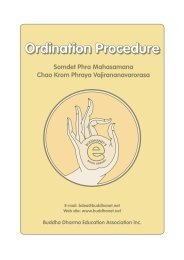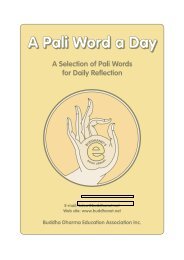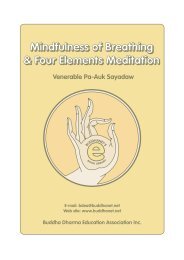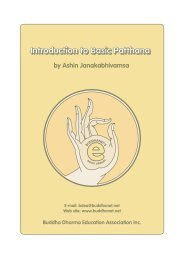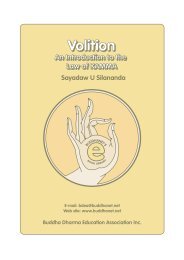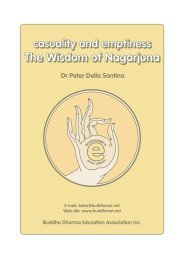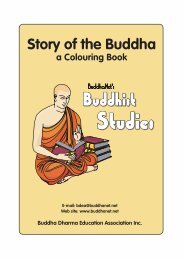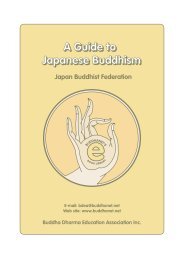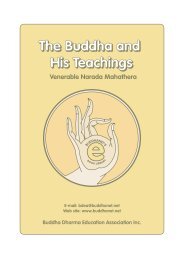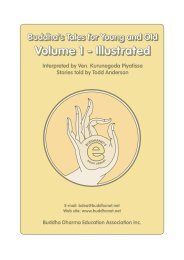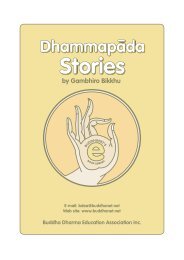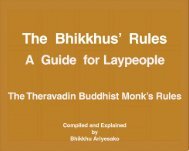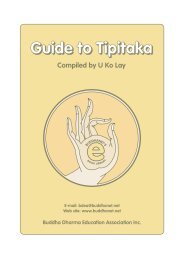No Inner Core: An Introduction to the Doctrine of Anatta - BuddhaNet
No Inner Core: An Introduction to the Doctrine of Anatta - BuddhaNet
No Inner Core: An Introduction to the Doctrine of Anatta - BuddhaNet
You also want an ePaper? Increase the reach of your titles
YUMPU automatically turns print PDFs into web optimized ePapers that Google loves.
<strong>of</strong> objects and persons, and <strong>the</strong> interior world <strong>of</strong> ego<br />
and self, are only conceptual constructs created by <strong>the</strong><br />
mind out <strong>of</strong> <strong>the</strong> elemental dhammas. Abhidhamma thus<br />
restricts itself <strong>to</strong> terms that are valid from <strong>the</strong> standpoint<br />
<strong>of</strong> ultimate realities: it describes reality in terms<br />
<strong>of</strong> ultimate truth. Thus it describes dhammas, <strong>the</strong>ir<br />
characteristics, <strong>the</strong>ir functions, and <strong>the</strong>ir relations. All<br />
conceptual entities, such as self or being or person, are<br />
resolved in<strong>to</strong> <strong>the</strong>ir ultimates, in<strong>to</strong> bare mental and<br />
material phenomena, which are impermanent, conditioned,<br />
dependently arisen, and empty <strong>of</strong> any abiding<br />
self or substance. Consciousness, for example, which<br />
seems like one continual flow, is described as a succession<br />
<strong>of</strong> discrete evanescent mental events, <strong>the</strong> cittas,<br />
and a complex set <strong>of</strong> mental fac<strong>to</strong>rs, <strong>the</strong> cetasikas, which<br />
perform more specialized tasks in <strong>the</strong> act <strong>of</strong> consciousness.<br />
There is no self, soul, or any kind <strong>of</strong> agent inside<br />
a person involved in this process. 2<br />
<strong>No</strong>w let us examine some <strong>of</strong> <strong>the</strong> terms related <strong>to</strong><br />
atta that we find in various sources. The definition <strong>of</strong><br />
Soul, Spirit given in <strong>the</strong> Abingdon Dictionary <strong>of</strong> Living<br />
Religions is as follows: “That which gives life <strong>to</strong> any<br />
animate thing; or <strong>the</strong> inner, essential, or noncorporeal<br />
part or dimension <strong>of</strong> any animate thing; or a noncorporeal<br />
but animate substance or entity; or a noncorporeal<br />
but individuated personal being.” 3<br />
<strong>An</strong>o<strong>the</strong>r definition <strong>of</strong> soul comes from Richard<br />
Kennedy in The International Dictionary <strong>of</strong> Religion:<br />
“Many religions teach that man is composed <strong>of</strong> a physical<br />
body, which does not survive death, and an eternal,<br />
invisible core which is <strong>the</strong> true self or soul.” 4<br />
10



